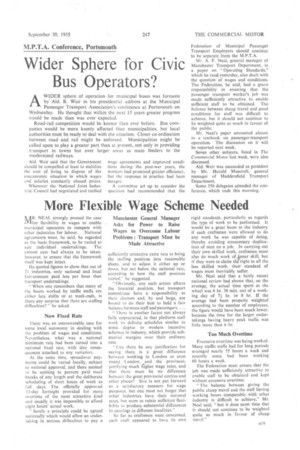M.P.T.A. Conference, Portsmouth
Page 53

If you've noticed an error in this article please click here to report it so we can fix it.
Wider Sphere for Civic Bus Operators?
AWIDER sphere of operation for municipal buses was foreseen by Aid. R. Weir in his presidential address at the Municipal Passenger Transport Association's conference at Portsmouth on Wednesday. He thought that within the next 15 years greater progress would be made than was ever expected.
Road-rail competition would be keener than ever before. Bus companies would be more keenly affected than municipalities, but local authorities must be ready to deal with the situation. Closer co-ordination between road and rail might be enforced. Municipalities might be called upon to play a greater part than at present, not only in providing transport in towns but over larger areas as main feeders to the modernized railways.
Ald. Weir said that the Government should be compelled at least to stabilize the cost of living to dispose of the uneconomic situation in which wages and salaries constantly chased prices.
Whenever the National Joint Industrial Council had negotiated and ratified wage agreements and improved conditions during the post-war years, the workers had promised greater efficiency, but the response in practice had been meagre.
A committee set up to consider the question had recommended that the Federation of Municipal Passenger Transport Employers should continue to be separate from the IVI.P.T.A.
Mr. A. F. Neal, general manager of Manchester Transport Department, in a paper on "Operating Standards," which he read-yesterday, also dealt with the question of wages and conditions. The Federation, he said, had a grave responsibility in ensuring that the passenger transport worker's job was made sufficiently attractive to enable sufficient staff to he obtained. The balance between cheap travel and good conditions for staff was difficult to achieve, but it should not continue to be weighted quite so much in favour of the public.
Mr. Neal's paper amounted almost to a textbook on passenger-transport operation. The discussion on it will be reported next week.
Seven other subjects, listed in The Commercial Motor last week, were also discussed.
Ald. Weir was succeeded as president by Mr. Harold Muscroft, general manager of Huddersfield Transport Department.
Some 350 delegates attended the conference, which ends this morning.




























































































